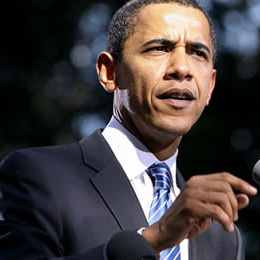What Else Is New

 IRD: How much weight do you assign to Barack Obama’s speech at the State Department last Thursday? Could it –as the US president stated- “mark a new chapter in American diplomacy”?
IRD: How much weight do you assign to Barack Obama’s speech at the State Department last Thursday? Could it –as the US president stated- “mark a new chapter in American diplomacy”?
SK: Well, from one aspect, the speech was quite important, but on the other hand, it had nothing new to offer us. My basic question is about Mr. Obama’s intentions in making this speech. If he wanted to clarify his position towards the popular uprisings of the region, he had done that already, as had several other senior American officials. I can think of three likely reasons behind his Arab Spring speech: first of all, he wanted to strike while the iron is hot and claim an accomplishment for US Middle East policy with Bin Laden’s assassination. He also referred to the US military withdrawal from Iraq and the timetable for moving out of Afghanistan –which is planned to begin from this summer- as a new phase of his foreign policy. Second, he wanted to draw attention to what he believed to be the similarity between the aspirations of the Middle East movements and the values of the United States, such as freedom of speech and religion, gender equality, the right to peaceful assembly, etc. Third, he tried to act proactively-- before Netanyahu’s visit to the United States which took place two days later- to publicize his stance on the Arab-Israeli conflict and the fate of Palestine. He knew he would not find the opportunity to make these explicit remarks after Netanyahu’s visit. I think Obama’s call for the formation of a Palestinian state with the pre-1967 borders was the only new point in his speech. Considering that the next presidential election will be held in 2012 and knowing the power of the pro-Israel lobby in US politics, his remarks were quite significant.
IRD: Obama spoke of a “new chapter” in US diplomacy. What may be the likely elements of this new diplomatic approach?
SK: I think this was a sort of lip service rather than the precursor of a serious move. Obama addressed Washington’s key interests in the Middle East: fighting terrorism, curbing nuclear proliferation, supporting free commerce, maintaining Israel's security and the Peace Process. These are all traditional interests safeguarded by former US presidents too, so speaking of a new chapter doesn’t make sense. Obama said that US interests in the region shouldn’t be pursued at the expense of Middle East nations. There are two points worth noting here: first of all, Obama implicitly acknowledges that this has been the trend so far, as the US’ support for iron-fisted dictatorships of the Middle East evinces. Second, in the very same speech Obama turned a blind eye to the oppressive political atmosphere in Saudi Arabia and Jordan, and while he pointed to violation of human rights in Bahrain, his tone was quite mild in comparison to his words about the situation in Syria. The former Tunisian president Zin el Abidine bin Ali, who was called a dictator by Obama, was a close ally of his country. I think Obama is following the traditional diplomatic line enforced by US diplomacy for years.
IRD: So you don’t believe that the US has shaped a coherent plan for the Middle East?
SK: As I said, his support for a Palestinian state with the pre-1967 borders was his only significant statement. No new plans are on the agenda, in my opinion. Of course, if Washington finds alternatives for some Middle Eastern rulers who can serve its interests in a better fashion, it will give them a shot. Otherwise, it will get along with its old friends. The US’ treatment of Yemeni and Bahraini rulers and its powerful strikes on Qaddafi targets is illustrative enough.
IRD: Are there any hopes for a final solution to or mitigation of Palestine’s plight with regard to Obama’s speech?
SK: Even if there was such a hope, Netanyahu’s strong criticism of Obama’s comments made it go up in smoke. Obama also discouraged the Palestinians from filing their request for a sovereign state in the next UN General Assembly. And you know that the US has the right to veto the Palestinians’ request in the Security Council. Of course, there is a slim possibility that Obama uses the Palestinians’ agenda as a lever against Israel to advance the Peace Process. The Hamas-Fatah deal has, of course, dimmed the prospect of peace.
IRD: Obama pointed to Iran in his speech. Do you think he has a clear Iran policy?
SK: I did not see any new point about Iran in his speech. Of course Obama did not refer to Iran as the root cause of the regional chaos, and did not use the sharp tone he used against Libya and Syria. But he repeated the usual claims, and accused Iran of misusing the situation in Bahrain. It was the typical dual standard applied by the US.

